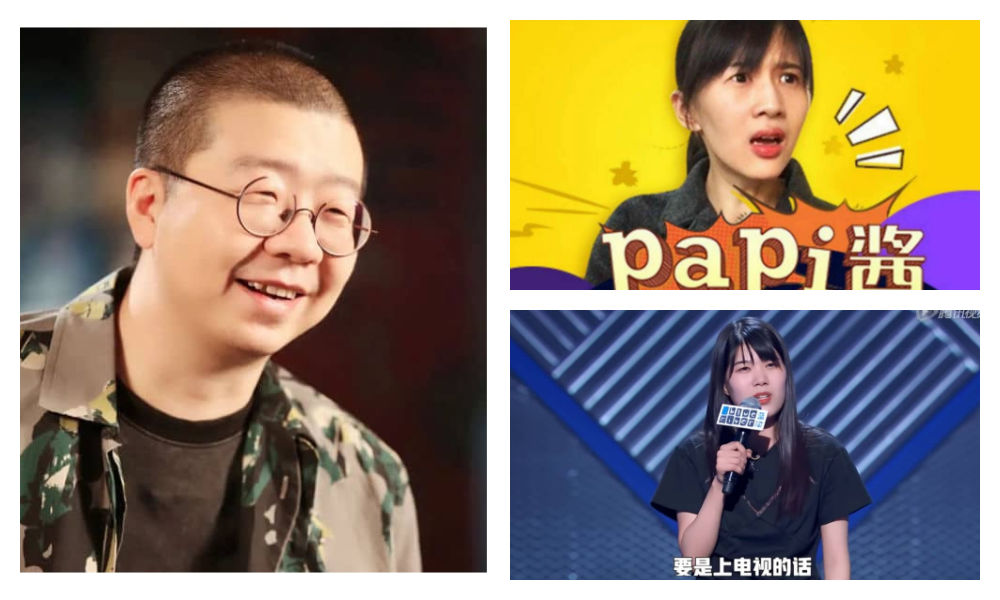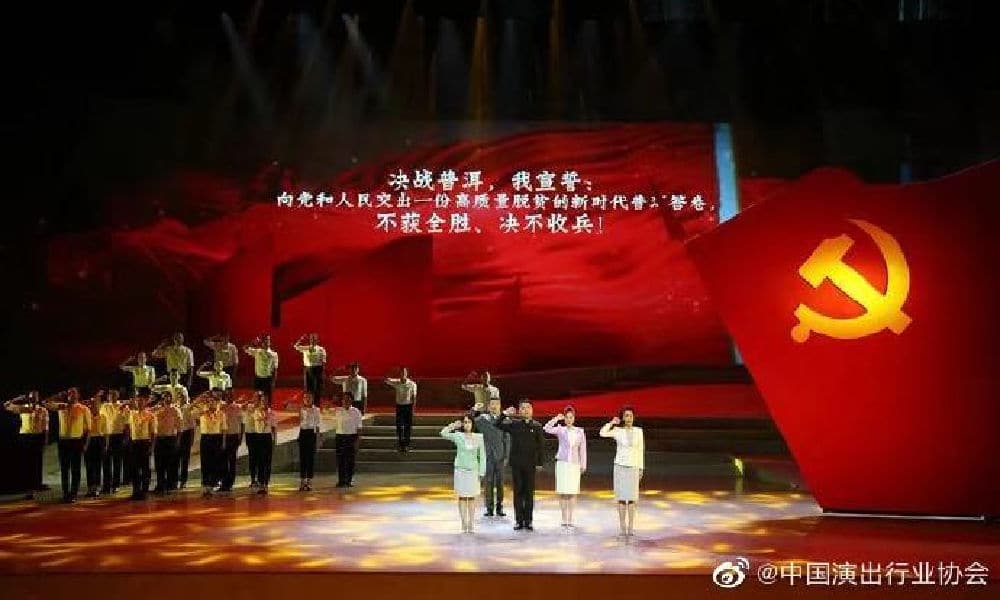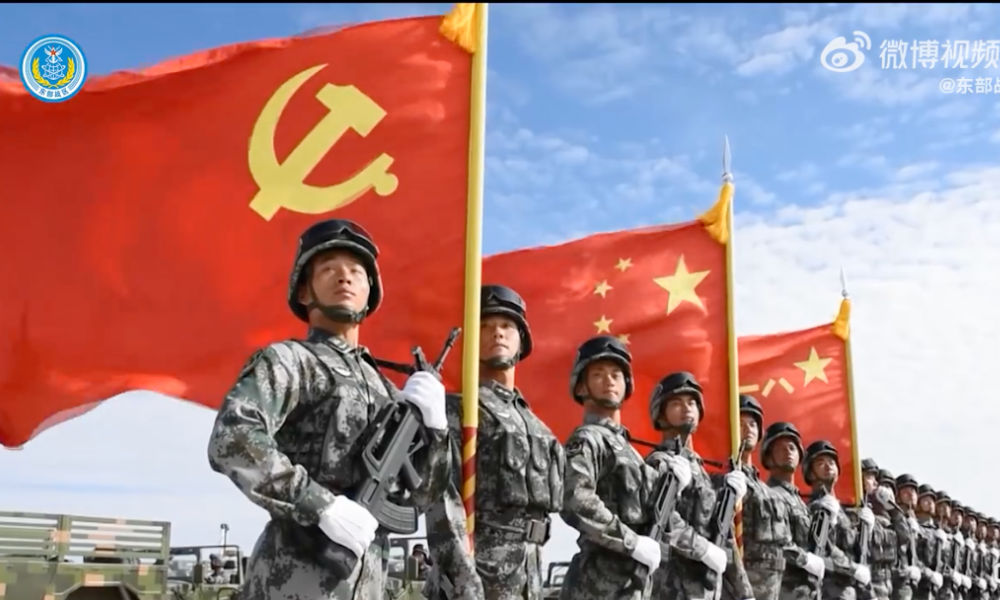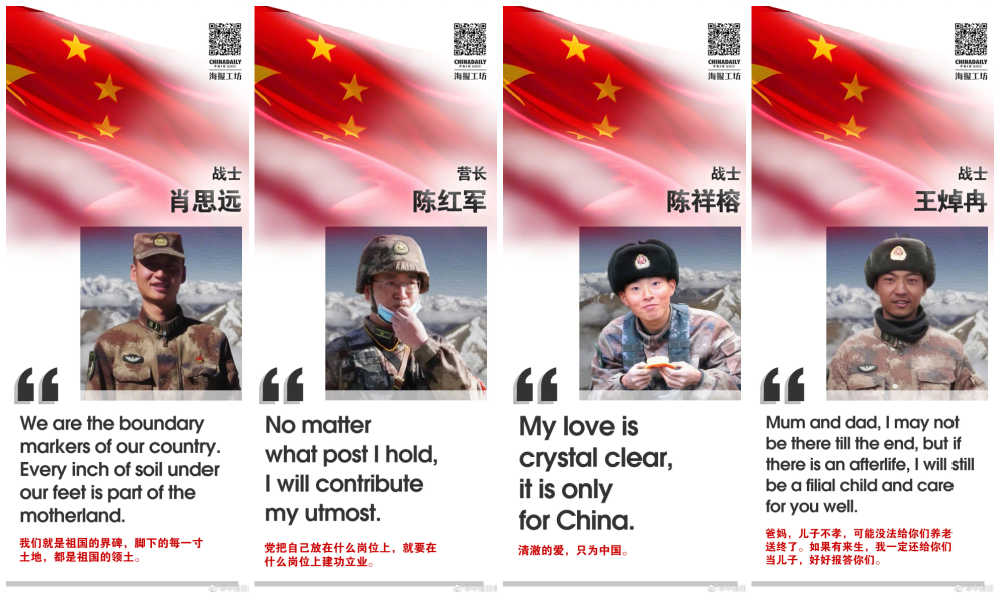Humor is no joking matter. While the business of humor can be competitive and challenging no matter where you are in the world, there are some special considerations and implications for working in humor in China.
This week, Chinese comedian Li Haoshi (李昊石), who performs under the name ‘House’, experienced firsthand that there are strict limitations to what can be openly satirized or joked about in China today. When one of his jokes about two stray dogs described them by referencing a famous People’s Liberation Army (PLA) slogan, he found himself at the center of a social media storm. One related hashtag received over 1.1 billion views on social media platform Weibo this week.
The phrases used in the comic skit, with Li saying they came to mind while watching the dogs chasing a squirrel, were: “Forge exemplary conduct, fight to win.” The lines are part of the PLA slogan “Follow the Party! Fight to win! Forge exemplary conduct!” (“听党指挥,能打胜仗,作风优良!”), which was used by Xi Jinping in 2013.
Li Haoshi was not just socially canceled by angry netizens who defended the honor of Chinese soldiers and slammed the comedian for being so unpatriotic, he also saw his career go up in flames. His shows were called off, he was banned from social media, his employer was fined more than $2 million, he was blacklisted under orders of the China Performing Arts Association (CAPA), and he is now under official investigation.
Following the controversy, there were different views on Chinese social media regarding the issue (read more here). Although the majority of commenters argued that the PLA is never to be joked about, some people also lamented that online discussions lacked nuance.
This scandal sheds light on a complex interplay of factors, including the working conditions within the Chinese comedy industry, the expectations placed on performers in the Chinese entertainment world, and the important role played by the People’s Liberation Army (PLA) in shaping Chinese nationalism.
HUMOR AND STAND-UP COMEDY IN CHINA
Humor has played a prominent role in Chinese language and culture for centuries, manifested through a diverse array of jokes and humorous texts. Professional comedians, who served to entertain the aristocrats, have been around since as early as 800 BC.
Although humor has always been there, it has not necessarily always been appreciated. Confucianism has played a significant role in devaluing humor in China, as it formally regarded humor and satire as inferior forms of aesthetic expression. Chinese rulers who did not tolerate criticism or dissent also could not appreciate jokes or comics which, in any way, went against their rule and authority (Sullivan & Sullivan 2021, 102; Yue 2008, 403-413).
In the early days of modern China, following the collapse of the Qing dynasty, there was a notable resurgence of various forms of humor and jokes that spanned two decades, including cross-talk (xiàngsheng 相声) and skits (xiǎopǐn 小品). It was during this period that the Mandarin word “yōumò” (幽默) was introduced, derived from the English term “humor.” This term was coined by the renowned Chinese writer and translator Lin Yutang (林语堂), who faced the challenge of finding an exact Chinese translation for the English word (Hsu 2015, 2).
For decades, from the founding of People’s Republic of China to the Anti-Rightists Movement and the Cultural Revolution and beyond, there was not much yōumò around. As described by David Moser (2004), the constraints imposed by the Party and political sensitivities severely limited the content and topics that comedians could explore.
The comparatively relaxed political atmosphere of the post-Mao era gave rise to novel forms of humor and comedy. In subsequent years, influenced by the United States, “stand-up comedy” (tuōkǒuxiù 脱口秀) also gained popularity. Initially originating in small bars or cafes in major cities such as Shanghai and Beijing, this comedic genre swiftly spread across the nation.
But similar to numerous other performance forms in China, stand-up comedy faces challenges in maintaining its spontaneity and provocative nature. Performers and comedy clubs are required to obtain licenses and gain script approval, while also navigating strict boundaries regarding politically sensitive topics that are strictly off-limits (Sullivan & Sullivan 2021: 102).
This does not mean that stand-up comedy is not thriving in China. On the contrary, the genre has only become more popular over recent years as stand-up comedy performers skillfully navigate the boundaries of what is acceptable by employing different techniques, such as irony, self-deprecation, and surreal humor to offer alternative perspectives within the permitted discourse (see: Chen and Gao 2023). In doing so, Chinese stand-up comedy has evolved beyond its American influences and embraced more traditional Chinese comedic language techniques from xiàngsheng and other performing arts.
In today’s landscape, Chinese comedians face a multitude of boundaries beyond just political ones. Operating within an environment where cultural and commercial factors hold significant sway, it becomes almost inevitable for popular performers to encounter controversy at some point in their careers. Authorities, audiences, sponsors, or companies may take offense at the content of their comedic expressions, adding further complexity to their navigation of these boundaries.

Li Dan, Papi Jiang, and Yang Li previously also faced criticism for their “inappropriate” or “vulgar” jokes.
The online comedian Papi Jiang (Papi酱), for example, saw her videos being taken offline in 2016 for containing “vulgar language and content,” after which she vowed to choose her words more carefully in the future. Female stand-up comedian Yang Li (杨笠), also known as the “punchline queen,” was dismissed as the spokesperson for American tech company Intel in 2021 for her jokes that allegedly insulted men. The popular talk show host and comedian Li Dan (李诞) sparked controversy for promoting female underwear brand Ubras with a slogan that was deemed sexist.
In such a working environment, it is difficult to fathom that the 31-year-old Li Haoshi, who had previously appeared on the immensely popular stand-up comedy competition show “Rock & Roast” Season Four, was unaware that his reference to a PLA slogan would surpass the acceptable boundaries. However, like many comedians, he may simply have been testing the limits.
THE POWER OF PERFORMERS
Another factor that comes into play when exploring the reasons behind the ‘House’ scandal is the special role attributed to Chinese performers.
Although Chinese performers and renowned names in the cultural industries have always been seen as fulfilling an exemplary role, this notion holds even greater significance in the era of social media, where Chinese performers and celebrities wield tremendous influence in an online environment with over one billion internet users. The rapid growth of online entertainment-focused apps and platforms has also created opportunities for unknown performers to achieve overnight fame.
There have been various studies about celebrities in China. One study from 2019 by Sullivan and Kehoe highlights the complexity of China’s celebrity scene. Because while the industry flourishes, it still operates under strict regulations imposed by both the state and industry stakeholders. Additionally, moral values play a significant role in shaping the industry. Sullivan and Kehoe argue that the state, through media and cultural industries, retains control over the symbolic economy within which celebrities operate (2019, 242).
Channeling public opinion and safeguarding social stability are priorities for Chinese authorities, and the influence of Chinese celebrities is often used to promote Party ideology and policies. While authorities encourage Chinese famous performers to act as positive role models, negative news surrounding the country’s popular stars is often perceived as having a “negative social impact” or a “bad influence on public morale.”
There are some some noteworthy instances that exemplify the significance of moral values and the role of Chinese celebrities as role models. One such example occurred in 2019 when Roy Wang (Wang Yuan 王源), a young Chinese singer and actor widely regarded as one of the country’s most influential teenagers, found himself embroiled in controversy after being caught smoking during a restaurant dinner in Beijing.

The incident surrounding Wang’s smoking quickly ignited a firestorm on Chinese social media. The controversy stemmed from two main factors. Firstly, Beijing had implemented a ban on smoking in all public indoor spaces since 2015, making Wang’s actions a violation of the law by lighting up in a restaurant. Additionally, as an influential teen icon, Wang held the responsibility of being a role model to his numerous fans, amplifying the impact of his behavior.
The idea that China should “raise the bar” for becoming a celebrity was widely propagated in 2021. In that same year, the China Association of Performing Arts (CAPA) officially released new guidelines for Chinese performers aimed at promoting adherence to the principles of “social morality.” According to these guidelines, performers could face a permanent ban from their profession if they fail to comply.

The guidelines are meant to “promote the healthy development of the performer industry” and lay out the “practice norms,” which stipulate that performers, among other things, should abide by national laws and regulations, should honor their contracts and comply with copyright laws. But they also stipulate that they should “love the motherland and support the Party’s line and policies” (“热爱祖国,拥护党的路线方针政策”), “persevere in the orientation that literature and art should serve the people and socialism” (“坚持文艺为人民服务、为社会主义服务的方向”), and “actively uphold a positive image” (“积极树立正面形象”).
By joking about the PLA, Li Haoshi violated some of the rules laid out by CAPA. His severe punishment not only demonstrates to the public that Chinese performers/celebrities should abide by the same laws as ordinary citizens – if not be held to even higher moral standards, – it also serves as a cautionary message to other entertainers, urging them not to overstep boundaries and to uphold their responsibility as public figures to positively impact public morale.
THE SACRED PLA
In addition to Li Haoshi’s position as a stand-up comedian and his role as a performer/celebrity, another significant aspect of this controversy revolves around the status of the People’s Liberation Army (PLA) in contemporary China. PLA soldiers are revered as the heroic “soldier sons of the people” who display unwavering loyalty to the Party and the nation.
The People’s Liberation Army (PLA) was founded in 1927, with Mao Zedong counted among its founders. It played a crucial role in the rise of the Chinese Communist Party and the establishment of the People’s Republic of China in 1949.
In addition to its core duty of protecting the country and conducting military operations, the PLA is also involved in other tasks such as peacekeeping efforts and disaster relief. However, its primary and most significant role is to serve as the military branch of the Chinese Communist Party (CCP) and ensure the CCP’s continued leadership in China. By safeguarding China’s sovereignty, territorial integrity, and unity, the PLA carries both a military and symbolic significance.
The PLA plays a major part in Chinese nationalist discourses, while simultaneously also playing a central role in driving nationalism in China. Whether it is the social media spectacle of China’s Taiwan military exercises or ‘100.000 soldier loving girls‘ during the Wuhan floods, the PLA acts as “a bridge between nationalism as an abstract ideological concept and as an everyday concern of the people for the security of their country” (Ji 2004, 248).

Military propaganda, often disseminated online, is important in reinforcing the image of PLA soldiers as guardians of the nation. When four Chinese PLA soldiers were killed during a border clash with Indian troops in 2020, Chinese state media outlets made noteworthy efforts to shape the ways in which the soldiers are to be remembered, blending political and personal elements while lauding their unwavering patriotism. In doing so, they posted their photos along with phrases such as “The place where I stand is China” and “I will defend the motherland with my life.”

Those insulting the PLA can face serious consequences under the “Heroes and Martyrs Protection Law” which was introduced in 2018. In 2021, former Economic Observer journalist Qiu Ziming (仇子明), along with two other bloggers, were the first persons to be charged under the new law as they were detained for “insulting” the Chinese soldiers. Qiu, who had 2.4 million fans on his Weibo page, made remarks questioning the number of casualties China said it suffered in the India border clash. He was sentenced to eight months in prison.
Li Haoshi’s faux-pas is particularly sensitive because the lines used in his joke indirectly made a comparison between PLA soldiers and stray dogs, while also placing words famously used by Xi Jinping in a ridiculous context. Additionally, as highlighted by Chinese bloggers and China Digital Times editor Alexander Boyd, Li’s joke potentially alludes to a scene from the 1956 Chinese war movie Battle on Shangganling Mountain (上甘岭) during the Korean War, where soldiers were depicted chasing after a squirrel. The intention of the scene was allegedly to showcase the kind-hearted nature of the brave soldiers of the Volunteer Army.
Was Chinese comedian Li Haoshi, with his controversial dog-chasing-squirrel joke, alluding to this squirrel-chasing scene from the famous 1956 Chinese Korean War movie "Battle on Shangganling Mountain"? Various Weibo bloggers claim that there is a connection. pic.twitter.com/2AjQKeIhVD
— Manya Koetse (@manyapan) May 21, 2023
Some people believe that Li Haoshi was purposely alluding to that scene with his joke, and in doing so, insulted China’s Korean War ‘martyrs,’ which is illegal under the martyr defamation law. That would be a serious offense. In 2022, former investigative journalist Luo Changping was sentenced to seven months in prison and ordered to make a public apology for insulting Chinese soldiers portrayed in a blockbuster movie about the Korean War.
Whether or not Li intended to make such a connection or put much thought into his joke remains uncertain. However, many netizens are angry with Li for various reasons. Chinese nationalists defend the honor of their hero soldiers, while others blame Li for not respecting the boundaries within which he should operate.
Furthermore, Li’s colleagues, Chinese stand-up comedians, are also upset that he took the risk of making a politically incorrect joke, which has put the entire industry under scrutiny. This incident has created more tension for other performers in an already challenging work environment.
On Chinese social Q&A platform Zhihu, one experienced stand-up comedian performer from Shandong shared his view on the matter, suggesting that Li has brought harm to their industry:
“For commercial performances, our lines have to first have to go through a script reading meeting, they will then go through 4-6 open rounds of ‘polishing,’ and then go through the script polishing of the copywriters working for the show. (..) Moreover, the words and phrases we use in our jokes must have a contextual understanding and source. Therefore, there is no way that Li Haoshi was not aware of the history and origin of the sentences he used.
At the same time, all of our jokes in commercial performances require approval. Therefore, Li Haoshi obviously knew that this particular joke wouldn’t pass the approval, so he intentionally didn’t submit it. This is not a case of ignorance, it is simply being malicious.”
Overall, Li Haoshi’s case serves as a warning to others to be cautious with their words, whether used during performances, talk shows, interviews, or online.
Jokes are not to be taken lightly in a media environment where every line carries weight. When humor becomes such a serious matter, it becomes increasingly challenging to stay funny.
By Manya Koetse
References (other online sources hyperlinked in text)
Chen, Dan, and Gengsong Gao. 2023. “The Transgressive Rhetoric of Standup Comedy in China.” Critical Discourse Studies 20 (1): 1-17.
Hsu, Pi-ching. 2015. Feng Menglong’s Treasury of Laughs. Leiden, The Netherlands: Brill.
Ji, You. 2004. “Nationalism, the Chinese Defence Culture and the People’s Liberation Army.” In: Leong H. Liew and and Shaoguang Wang (eds), Nationalism, Democracy and National Integration in China, pp. 247-268. London: RoutledgeCurzon.
Moser, David. 2004. “Stifled Laughter: How the Communist Party Killed Chinese the Chinese Humor Form of Xiangsheng.” Danwei.org http://www.danwei.org/tv/stifled_laughter_how_the_commu.php, accessed via https://www.academia.edu/5929719/Stifled_Laughter_How_the_Communist_Party_Killed_Chinese_the_Chinese_Humor_Form_of_Xiangsheng [20 May 2023].
Sullivan, Lawrence R. and Nancy Sullivan. 2021. Historical Dictionary of Chinese Culture. New York and London: Rowman & Littlefield
Sullivan, Jonathan, and Séagh Kehoe. 2019. “Truth, Good and Beauty: The Politics of Celebrity in China.” The China Quarterly 237 (March): 241–256.
Yue, Xiao Dong. 2008. “Exploration of Chinese Humor.” Humor: International Journal of Humor Research 21 (4): 407-421.
Get the story behind the hashtag. Subscribe to What’s on Weibo here to receive our newsletter and get access to our latest articles:
Spotted a mistake or want to add something? Please let us know in comments below or email us. First-time commenters, please be patient – we will have to manually approve your comment before it appears.
©2023 Whatsonweibo. All rights reserved. Do not reproduce our content without permission – you can contact us at info@whatsonweibo.com.
The post From Comedy to Controversy: Behind the Li Haoshi Incident appeared first on What's on Weibo.